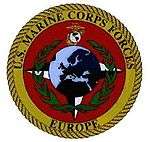United States Marine Corps Forces, Europe
| U.S. Marine Corps Forces, Europe | |
|---|---|
 | |
| Country | United States |
| Branch | United States Marine Corps |
| Type | Service Component |
| Role | Headquarters Element |
| Size | 1.500+ |
| Part of | United States European Command |
| Garrison/HQ | Panzer Kaserne, Böblingen, Germany |
United States Marine Corps Forces Europe (also known as MARFOREUR), headquartered in Panzer Kaserne-Barracks in Böblingen, Germany, is the U.S. Marine Corps component of the U.S. European Command.
History
In February 1980 the Commandant of the Marine Corps and the Chief of Naval Operations revised the operational task sharing between both referring branches of the armed forces in a memorandum. Hitherto the USMC had a supporting role within the United States Naval Forces Europe (NAVEUR). When that agreement came into effect on July 1, 1980, Headquarters, Fleet Marine Force Europe, the predecessor of the present unit, was founded in London including an independent 40-person staff as a Designed Component Command, to act as a Command Unit for further formations to be put under EUCOM-Command in case of a crisis situation. That staff immediately began preparing operation plans for optimal replenishment and deployment when required. FMF Europe arranged Marine support for Operation Provide Comfort, Operation Provide Promise, and Operation Deny Flight. To match increasing challenges better, headquarters were transferred to Böblingen near Stuttgart on November 8, 1993. In February 1994 the headquarters was renamed MARFOREUR.
MARFOREUR is now dual-hatted as Marine Corps Forces, Africa, since November 2008.[1]
Organization
Currently, MARFOREUR has a manning level of more than 1,500 Marines, of which about 100 serve at headquarters in Böblingen.[2]
MARFOREUR serves as a headquarters and liaison organization for USMC efforts in the EUCOM area of responsibility. In normal circumstances Marine elements in the theatre are few - routinely, the Marine Expeditionary Unit attached to United States Sixth Fleet, and possibly other small units and detachments. Yet the HQ makes it possible to call upon forces from II Marine Expeditionary Force (II MEF), based at Camp Lejeune, North Carolina. This force comprises the 2nd Marine Division, the 2nd Marine Aircraft Wing, and the 2nd Marine Logistics Group, formerly known as the 2nd Force Service Support Group.
II MEF would also supply forces for the Norway Air-Landed Marine Expeditionary Brigade (NALMEB).[3] NALMEB is a remnant NATO Cold War reinforcement organization, and would have come under command of Allied Forces Northern Europe. Significant equipment storage for a MEB is located in northern Norway,[4] and administered in the continental United States by Blount Island Command. The Norwegian Government has integrated the presence of a MEB into its defense planning, and thus has probably slightly reduced the size of its armed forces in consequence.
Yet the tasking is now more theoretical than real, as the last confirmed deployment was Exercise Battle Griffin in 1991, in which the 2nd Marine Expeditionary Brigade, made up from USMCR reserve units due to Operation Desert Storm, made the first test of the concept. The exercise was conducted in February and March 1991 and the Brigade was made up of the 25th Marines regimental headquarters, 3rd Battalion, 25th Marines (infantry), Company E, 4th Reconnaissance Battalion, and 1st Battalion, 14th Marines (artillery).[5]
In 2014 the USMC added heavy armored vehicles to NALMEB for the first time.[6]
External links
| Wikimedia Commons has media related to United States Marine Corps Forces, Europe. |
See also
References
- ↑ http://www.africom.mil/getArticle.asp?art=2252
- ↑ History of United States Marine Corps Forces, Europe
- ↑ NALMEB on globalsecurity.org
- ↑ Marine Corps Prepositioning Program-Norway
- ↑ Thomas D. Dinackus, Order of Battle: Allied Ground Forces of Operation Desert Storm, Hellgate Press, Central Point, Oregon, 2000, Chart 22-3, ISBN 1-55571-493-5
- ↑ Trevithick, Joseph (16 August 2014). "The Pentagon Is Stuffing Caves in Norway Full of Tanks". medium.com. war-is-boring. Retrieved 16 August 2014.